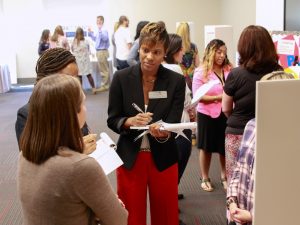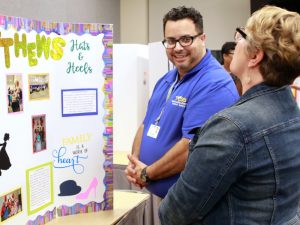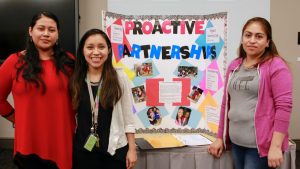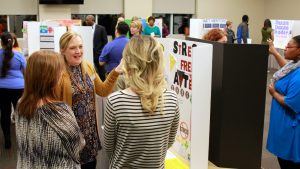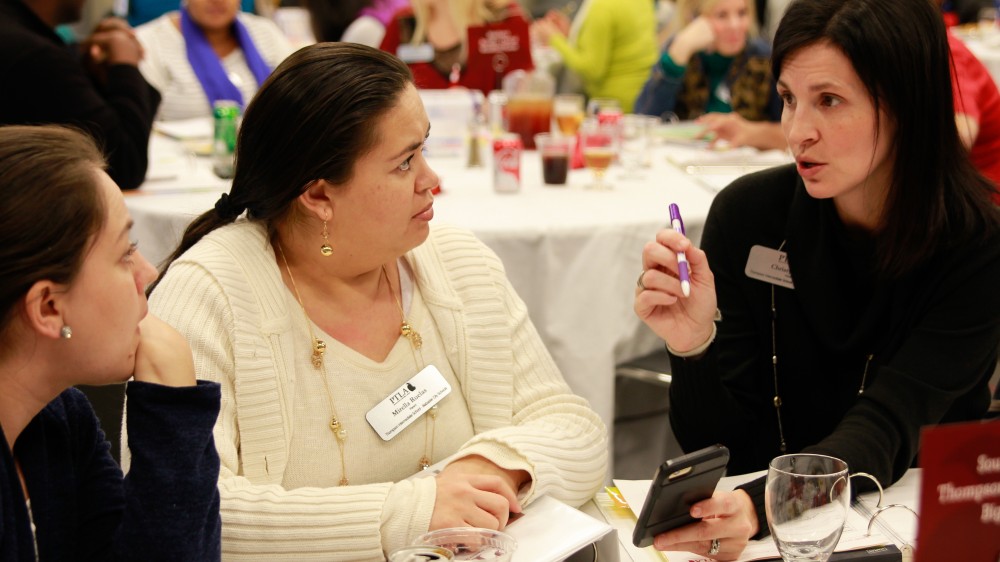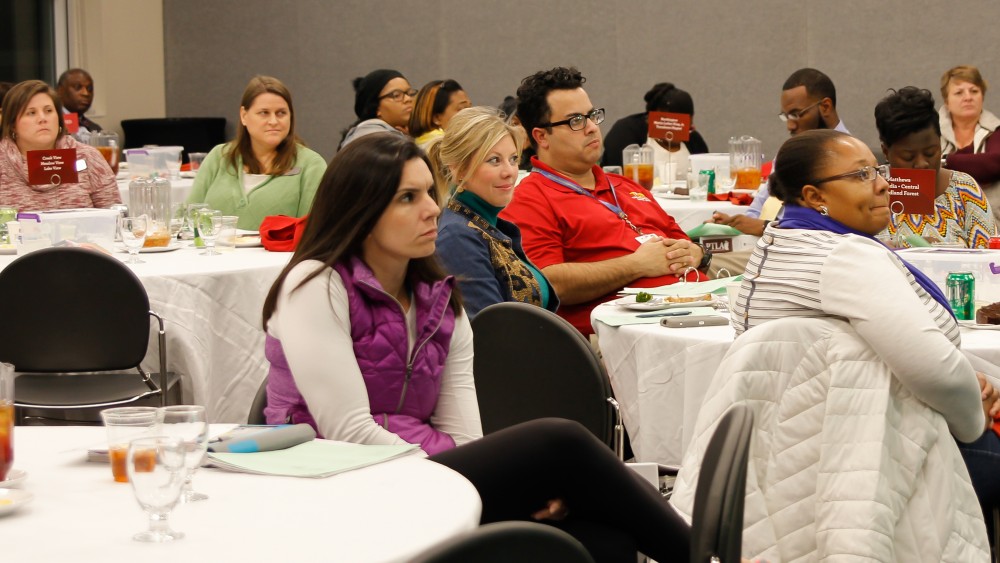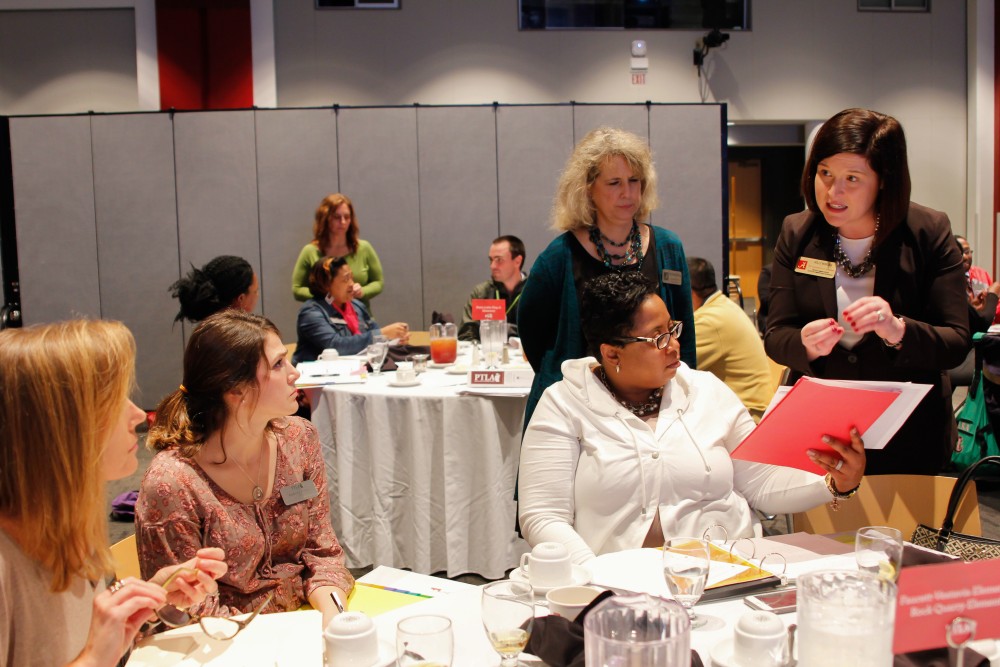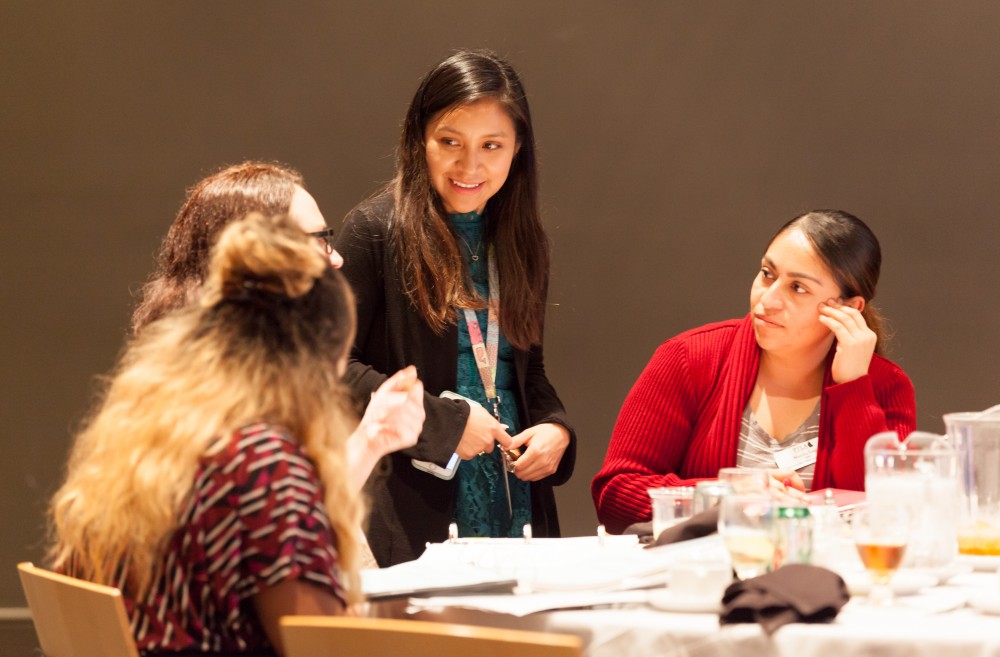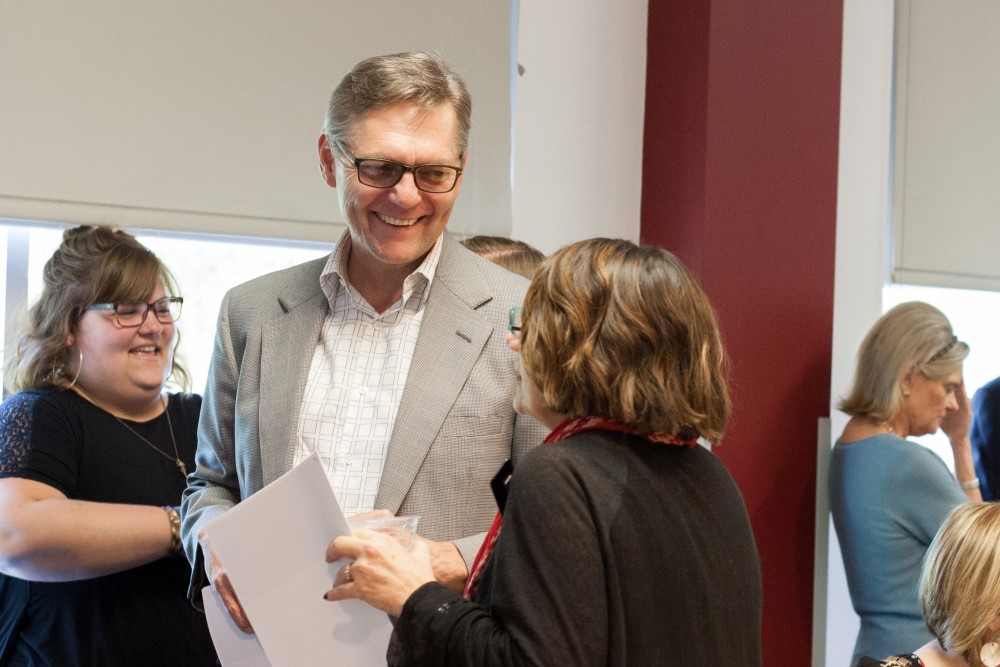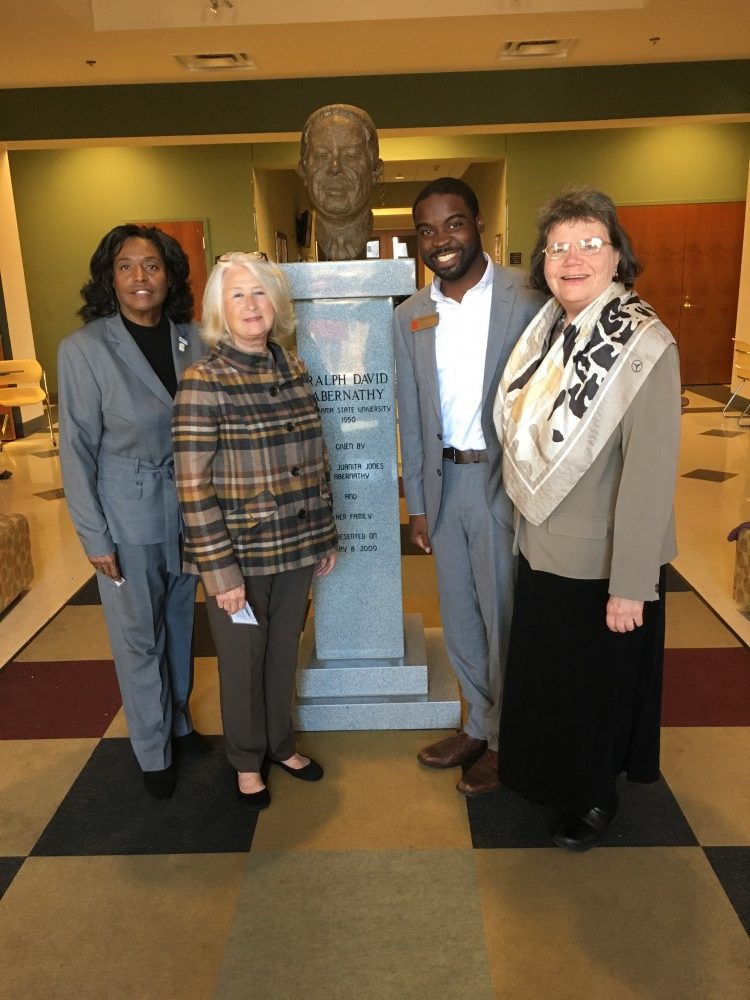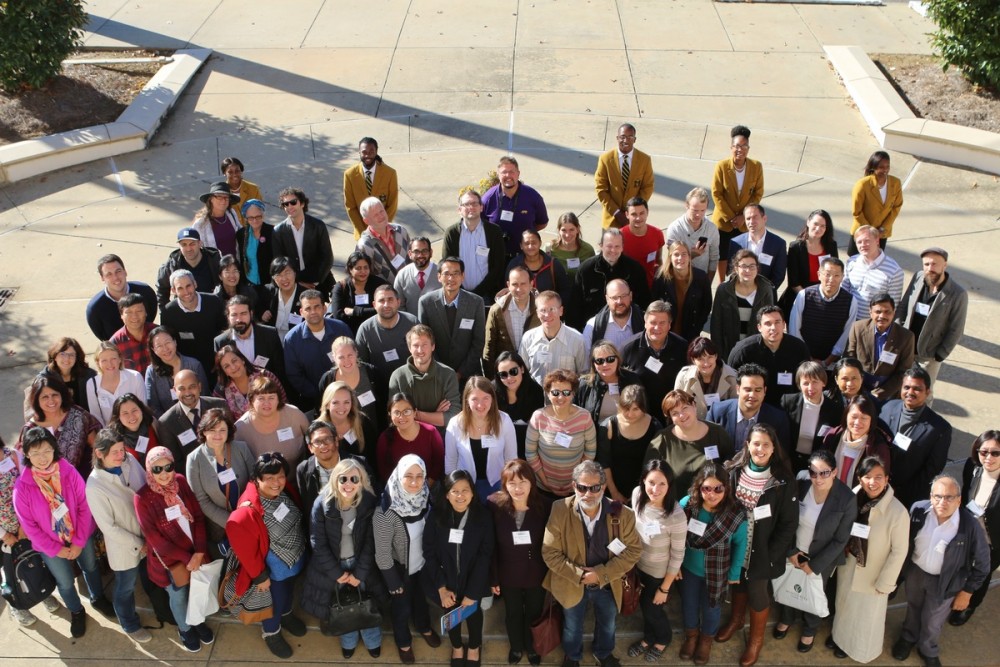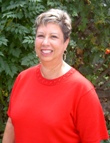Tuscaloosa, Ala. — The Council on Community-Based Partnerships held its first meeting of the spring semester Thursday, Feb. 16 in the Bryant Conference Center Birmingham Room on campus.
In his opening remarks, Dr. Peter Hlebowitsh, education dean, welcomed those present and emphasized, “We’re stronger when we work together.” He went on to speak about service, research and teaching, noting that what this group [the Council] offers is a way of synthesizing these three things. “When that happens, it’s very beautiful, and it’s efficient, as well,” he said.
Dr. Vicki Vandiver, School of Social Work dean, began by saying, “What better place to be than with you talking about community? Samory [Dr. Samory T. Pruitt] lives and breathes community, and that is what we are about, as well.”
Vandiver spoke to the group about what the school is doing to reach out to the community, noting that the school is built on the notion of community and that the organizations they work with are the lifeblood of what they do.
“Public health has its origins in social work,” said Vandiver. “We have always been a part of community, so it is not surprising that we are community servants. We are tiny, but mighty [referring to UA Social Work].”
With 40 full-time faculty, 19 full-time staff and 600 students, the UA School of Social Work is one of the most comprehensive schools of social work in the state. Fifty percent of students’ schooling is taking courses; the other 50 percent is community outreach work and internships. These figures emphasize the need they have to keep the community organizations they work with informed of their efforts. Their students want to be more involved in the community and it is up to the school to provide the academic structure for students to do that. To that end, UA Social Work is affiliated with 600 agencies, with 250–300 of those affiliations being active relationships. She reported that the school performs 1,084 hours of community service annually — a value of $3 million if paid for.
Vandiver said that their scholarship and initiatives support community engagement, as well.
In terms of scholarship, Vandiver highlighted some of the areas in which her school is working with the Council, including: 1) seed funding for students and faculty, 2) two graduate fellowships — the recipients have gone on to do work with AIDS and policy work, and 3) having students serve in Dallas and Marengo counties for the purpose of conducting a needs assessment. Additionally, they have upcoming plans to work with Davis-Emerson Middle School. Vandiver noted that these programs would not be possible without the support of Community-Based Partnership partners.
Speaking on initiatives, Vandiver spoke of the dynamic leadership at UA that ties in with communities, noting specifically that UA’s president and provost are supportive of research and engaging the community. She mentioned current initiatives the school is participating in, which are connected to their field office. Among them are arranging placements in the Tuscaloosa mayor’s office and being involved in a two-year program with Tuscaloosa Fire & Rescue, in which they have embedded social workers with EMS workers and first responders. Additionally, they have partnered with the College of Community Health Sciences (CCHS) to work with the UA/Pickens County partnership.
“We are developing partnerships with the community at a pace we have never had before,” she said.
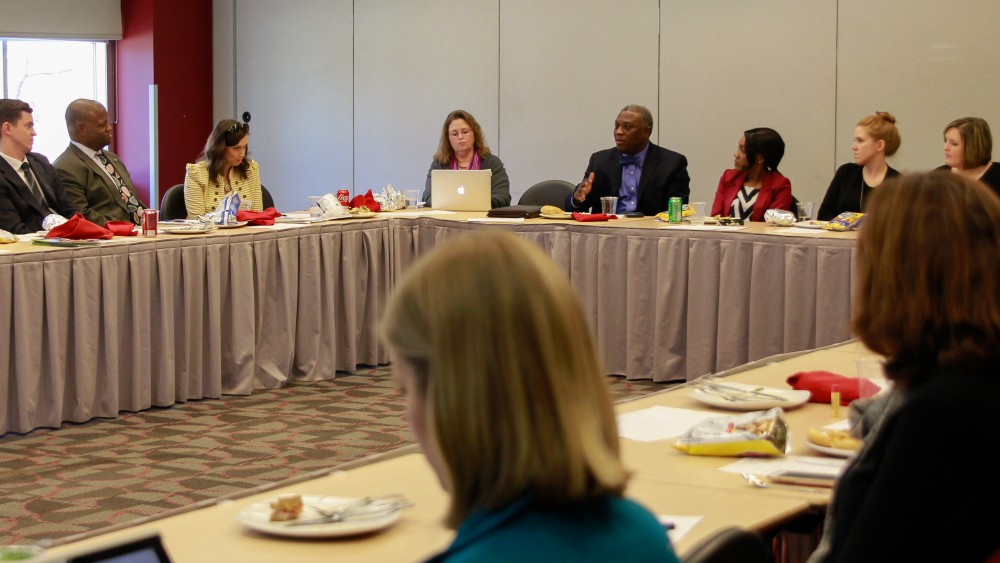
Dr. Samory Pruitt, vice president for Community Affairs, expanded on Vandiver’s sentiment, saying that UA has done well to add leadership at the dean’s level that has embraced the concept of engaged scholarship. “It’s really interesting, over the last six or seven years, how many deans have come here who understand and embrace community engagement,” he said. “We have consistently added deans who get this. When we completed our Carnegie certification a couple of years ago, having these deans was a part of this.”
He reported that the Faculty Activity Report (FAR) has been delayed slightly because UA will be using outside sources to move the project forward. Then he shared information about the ACCESS (Alabama Centralized Community Engagement Scholarship System) software project, which has been contracted with the UA Computer Science Department. The software will help map engaged scholarship projects, allowing for valuable communication and information sharing on engaged scholarship efforts across campus. When completed, the software will allow project creation and updates in real time and anyone with Internet access will be able to view the projects and videos shared on this site.
“We don’t just want to generate reports, but also consistently identify projects that faculty are involved in and find a way to share what they are doing with each other,” Pruitt said, addressing the importance of building relationships.
Dr. Pruitt reported that those working on this project hope to have a demo ready in time to share at our next spring Council meeting. He also noted that some of the faculty members who helped with the FAR pilot will be asked to look at where we are soon to make sure we are going in the right direction. Dr. Pam Foster, deputy director/associate professor, Rural Health Institute, mentioned that a system called PURE is already being used on other campuses, such as Tulane University, that we might be able to look at as a reference point, as well.
Felicia Simpson, service grant writer/school partnership coordinator in The College of Education, spoke to the Council on service grant collaborations. She shared that during the time she previously worked in the Gadsden City School system, she grew to care greatly about the children involved in the after-school programs (latch-key kids). She noted that the State Department of Education has been pushing the topic of community engagement lately, and went on to point out that we get only 20 percent of a student’s day to help them achieve what they need to achieve, and that without community engagement, these children will not be successful.
She reported that there is an after-school network in each state; a support group to help after-school programs through professional development. There is a lot of STEM engagement, connecting with workforce councils, and many business connections are made through this after-school network programming.
She is working with the Tuscaloosa County School system on their school improvement grant and is also working to bring several of their teachers into the College to earn their advanced degrees.
Additionally, the College is working with Dr. Karl Hamner, assistant dean for research and director of the Office of Evaluation, School of Social Work and College of Education, to evaluate other after-school programs in order to capture data and move their own program forward. They are working quickly to try to connect those in education and to help provide resources for them so that they can be certain the College is serving its students across the state.
Drs. Hlebowitsh and Pruitt spoke briefly about the New Faculty Community Engagement Tour, which is being created as a means to help new faculty become aquatinted with the culture, history and life at The University of Alabama. They reported that the logistics became difficult because of obligations with teaching, etc., but that there is a small window of time when the semester concludes that members of the faculty are under contract to remain on campus. This is the time they are working to target. These daylong tours will be organized by Dr. Pruitt and will likely hold a “tour of life in rural Alabama” theme, taking place over the course of three days. Because of drive time, there will probably be three stops each day. Dr. Pruitt gave possible examples of areas to be included that could help faculty members become engaged in these communities. Examples included a focus on hubs such as Tuscaloosa, Hale and Green Counties; then Selma and Marengo and Perry Counties; followed by Pickens County and possibly Sumter or another county. He indicated that he would keep people updated as the details are fleshed out.
The Council Executive Committee Chairs then gave their reports.
Dr. Jen Nickelson, chair of the Academic Conference and Presentation Support Committee, reported that applications for travel funds and poster presentations have been received and that everyone who applied should be notified of their status by March 10.
Dr. Rebecca Allen, chair of the Faculty Teaching and Research Support Committee, gave a brief update on the Committee’s activities, notifying the Council that their committee has received graduate student applications and that they will meet shortly to rate those applications. Allen indicated that the committee would submit recommendations by March 1.
Dr. George Daniels, chair of the Excellence in Community Engagement Recognition Committee, reported that the committee met for the first time Monday, February 6. Committee members are looking at ways to improve the annual CCBP Awards Luncheon, including emphasizing to students the importance of attending the luncheon and not just presenting a poster. The committee hopes to have some innovative ways to present engaged scholarship work that is being done on campus as well. Their next meeting will be Thursday, February 23.
Updates from the CCBP followed.
Dr. Beverly Hawk spoke to the Council about UA’s Fulbright Scholarship status. “Thank you for sending me so may wonderful students, who have the guts to apply,” she said. “Fulbright loves you; Fulbright loves everybody you send.”
Hawk reported that UA currently has applicants studying in the UK, in Poland and in Zambia. Additionally, we have four people serving as English Teaching Assistants: one in Russia, one in Poland, one in South Korea, and one in Germany. She also reported that the University has 18 students who were chosen to be potential Fulbright Scholars for the 2017–2018 academic year (otherwise known as the survivors of the American juries). She also informed the group that UA is a Top Fulbright-Producing Institution, as of last year, as listed in The Chronicle of Higher Education.
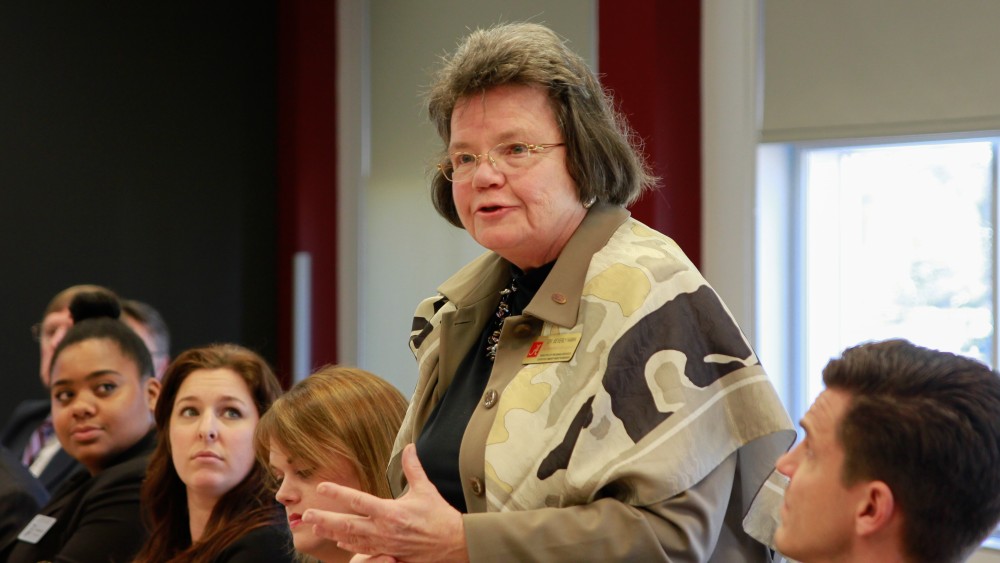
Dr. Jim McLean gave an update on the Grants and Sustainability Workshops, saying that the final coaching session is scheduled to take place Tuesday, March 7. He is working now to collect information from the 10 teams who are taking part in the workshops, and reported that participant evaluations have been high.
The second round of workshops has been approved and will begin before the start of fall classes. A handout containing pertinent information was shared with those in attendance. The first two days of seminars will focus on acquiring government grants and then approving corporate grants. This series will continue to feature David G. Bauer. Applications will be accepted for up to eight teams, as well as some individuals who wish to apply, as space is available, for a total of up to 50 people. For additional information, interested teams and individuals should contact Dr. Jim McLean.
Following Dr. McLean’s update, Dr. Rick Streiffer, dean of CCHS, spoke to the Council regarding the UA/Pickens County Health Care Teaching Partnership. He shared that approximately three years ago, a crisis began in Pickens County when it looked as if their hospital might be closed due to financial concerns. At the time, the hospital was operating on less than one week’s cash and had to lay off many employees.
Doctors worried about what would happen to the county if the hospital closed. “If you don’t have healthcare, communities collapse,” he said. The doctors began talking, and it grew from there, he reported.
“We could not put money into saving the hospital, but it was an important asset, and we didn’t want to lose the asset,” said Streiffer.
Conversations about identifying resources continued, and it was determined that the resource we could offer them as a University was the use of our UA brand and our students to help steer the community dynamic in a positive direction. From these conversations came the idea to partner students with local people, agencies, and legislators. Through the partnership, the concept of a teaching county (similar to a teaching hospital) was formed and funds were received to move forward.
There is a person placed in the hospital, and they also envisioned utilizing students to address health-related community needs. The third element was helping to develop a workforce of young, enthusiastic people. Dr. Streiffer shared that the students involved in this project are recent UA graduates who are doing a gap year before moving on to the next stage of their education.
Eight faculty projects were awarded this past year, including the development of a rural family medical program, improving access to cardiac rehabilitation services, bringing healthy food options and ease of preparation home, and the Alabama literacy project.
The first step was conducting a community needs assessment, which identified three categories of needs: education, transportation and resources.
To address resources, they created a resource guide that is also accessible online for residents of the county. Five hundred printed copies of the guide were distributed to community organizers, and 1,000 additional copies are due to be printed soon.
Pickens County is considered a food desert, so following the community needs assessment, the idea of community gardens was born. Community members will work in the gardens two days a week and will be provided with all of the resources and instruction they need to help grow these gardens. The gardens will not only provide healthy food options, but the people involved in the project will learn how to grow food, and will also learn the importance of giving back to the community when the food grown in the gardens is donated to the food pantry.
Most schools do not have a health teacher or a health curriculum and one in three children in Alabama is considered obese. Through the partnership, students are working with six elementary classes to address topics within the CDC’s Comprehensive Health Education Standards in order to help expand health knowledge within the schools. Rates of chronic diseases are also more prominent in rural areas, so they are conducting cooking and nutrition courses after school to help children learn how what they eat can affect their health. This effort is aimed at lowering the prevalence of chronic disease. The group has also tasked themselves with doing health screenings to reach as many children as they can in Pickens County. They have already completed K–6 grade and will soon begin to work with the high school students.
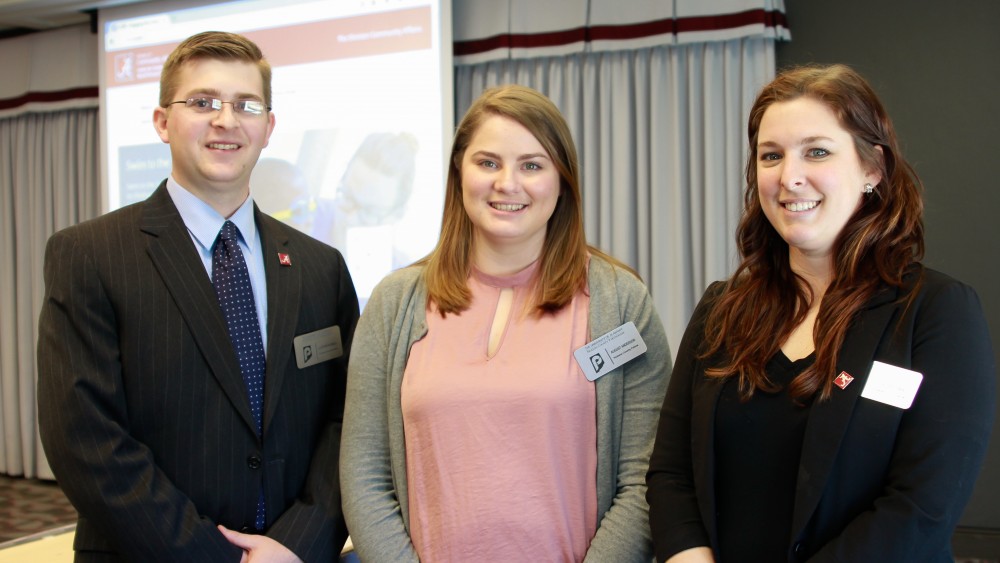
(More about the UA/Pickens County Partnership is available at https://cchs.ua.edu/pickenscounty/ .)
Dr. Darrin Griffin, assistant professor of communication studies, spoke to the Council about partnerships with the Alabama Institute for the Deaf and Blind. He reported that there is a large disconnect between the deaf community and The University of Alabama and that he has been working to bridge this gap within our state. Related to that, he will be teaching a class on deaf culture at UA during the fall semester. He also indicated that there is not a lot of opportunity at UA to help deaf students achieve the level of education that they deserve to achieve. He reported that he is currently working with NOAA to help with tornado warnings within Alabama for deaf people. He asked those present to think about how they might involve him in doing what they do, to work together for the betterment of the deaf community moving forward.
Announcements followed. The next CCBP Council meeting will take place Thursday, April 6, at 11:30 a.m. at the Bryant Conference Center, Birmingham Room. The Annual CCBP Awards Luncheon will take place Friday, April 14, with poster presentations at 10 a.m. and the luncheon at 11:30 a.m. in the Bryant Conference Center, Sellers Auditorium.
The meeting was adjourned at 1:00 p.m.
The Council exists to connect faculty, staff, students and community partners in research-based projects designed to solve critical problems identified collaboratively by community members and the University. All academic disciplines, as well as a number of students and community members, are represented on the Council. The Council conducts an awards program, oversees project funding, proposes methods to integrate teaching and research and seeks outside funding, all with the goal of fulfilling the Division of Community Affairs’ motto: “Engaging Communities and Changing Lives.”
The Division of Community Affairs was created in 2004 and is recognized nationally and internationally for its leadership in community engagement. The division provided the leadership for the recent reaffirmation of the University’s Carnegie curricular and community engagement classification. The division publishes the Journal of Community Engaged Scholarship, one of the leading refereed journals in the field.
